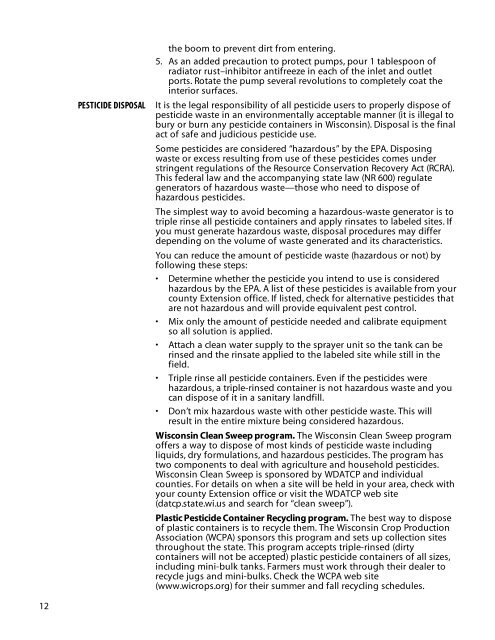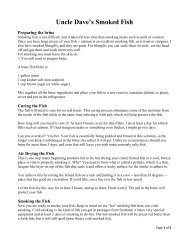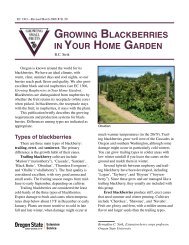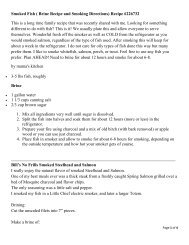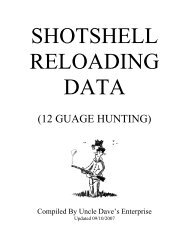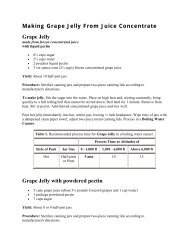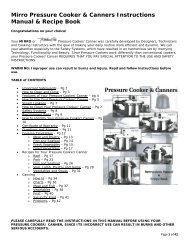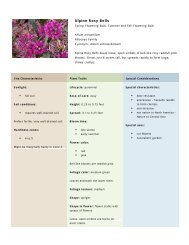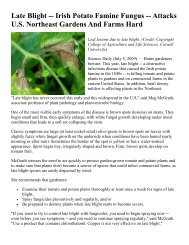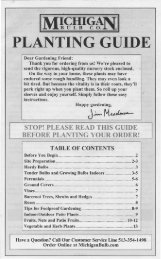Strawberry and Raspberry Pest Management in Wisconsin
Strawberry and Raspberry Pest Management in Wisconsin
Strawberry and Raspberry Pest Management in Wisconsin
You also want an ePaper? Increase the reach of your titles
YUMPU automatically turns print PDFs into web optimized ePapers that Google loves.
12<br />
the boom to prevent dirt from enter<strong>in</strong>g.<br />
5. As an added precaution to protect pumps, pour 1 tablespoon of<br />
radiator rust–<strong>in</strong>hibitor antifreeze <strong>in</strong> each of the <strong>in</strong>let <strong>and</strong> outlet<br />
ports. Rotate the pump several revolutions to completely coat the<br />
<strong>in</strong>terior surfaces.<br />
PESTICIDE DISPOSAL It is the legal responsibility of all pesticide users to properly dispose of<br />
pesticide waste <strong>in</strong> an environmentally acceptable manner (it is illegal to<br />
bury or burn any pesticide conta<strong>in</strong>ers <strong>in</strong> Wiscons<strong>in</strong>). Disposal is the f<strong>in</strong>al<br />
act of safe <strong>and</strong> judicious pesticide use.<br />
Some pesticides are considered “hazardous” by the EPA. Dispos<strong>in</strong>g<br />
waste or excess result<strong>in</strong>g from use of these pesticides comes under<br />
str<strong>in</strong>gent regulations of the Resource Conservation Recovery Act (RCRA).<br />
This federal law <strong>and</strong> the accompany<strong>in</strong>g state law (NR 600) regulate<br />
generators of hazardous waste—those who need to dispose of<br />
hazardous pesticides.<br />
The simplest way to avoid becom<strong>in</strong>g a hazardous-waste generator is to<br />
triple r<strong>in</strong>se all pesticide conta<strong>in</strong>ers <strong>and</strong> apply r<strong>in</strong>sates to labeled sites. If<br />
you must generate hazardous waste, disposal procedures may differ<br />
depend<strong>in</strong>g on the volume of waste generated <strong>and</strong> its characteristics.<br />
You can reduce the amount of pesticide waste (hazardous or not) by<br />
follow<strong>in</strong>g these steps:<br />
• Determ<strong>in</strong>e whether the pesticide you <strong>in</strong>tend to use is considered<br />
hazardous by the EPA. A list of these pesticides is available from your<br />
county Extension office. If listed, check for alternative pesticides that<br />
are not hazardous <strong>and</strong> will provide equivalent pest control.<br />
• Mix only the amount of pesticide needed <strong>and</strong> calibrate equipment<br />
so all solution is applied.<br />
• Attach a clean water supply to the sprayer unit so the tank can be<br />
r<strong>in</strong>sed <strong>and</strong> the r<strong>in</strong>sate applied to the labeled site while still <strong>in</strong> the<br />
field.<br />
• Triple r<strong>in</strong>se all pesticide conta<strong>in</strong>ers. Even if the pesticides were<br />
hazardous, a triple-r<strong>in</strong>sed conta<strong>in</strong>er is not hazardous waste <strong>and</strong> you<br />
can dispose of it <strong>in</strong> a sanitary l<strong>and</strong>fill.<br />
• Don’t mix hazardous waste with other pesticide waste. This will<br />
result <strong>in</strong> the entire mixture be<strong>in</strong>g considered hazardous.<br />
Wiscons<strong>in</strong> Clean Sweep program. The Wiscons<strong>in</strong> Clean Sweep program<br />
offers a way to dispose of most k<strong>in</strong>ds of pesticide waste <strong>in</strong>clud<strong>in</strong>g<br />
liquids, dry formulations, <strong>and</strong> hazardous pesticides. The program has<br />
two components to deal with agriculture <strong>and</strong> household pesticides.<br />
Wiscons<strong>in</strong> Clean Sweep is sponsored by WDATCP <strong>and</strong> <strong>in</strong>dividual<br />
counties. For details on when a site will be held <strong>in</strong> your area, check with<br />
your county Extension office or visit the WDATCP web site<br />
(datcp.state.wi.us <strong>and</strong> search for “clean sweep”).<br />
Plastic <strong>Pest</strong>icide Conta<strong>in</strong>er Recycl<strong>in</strong>g program. The best way to dispose<br />
of plastic conta<strong>in</strong>ers is to recycle them. The Wiscons<strong>in</strong> Crop Production<br />
Association (WCPA) sponsors this program <strong>and</strong> sets up collection sites<br />
throughout the state. This program accepts triple-r<strong>in</strong>sed (dirty<br />
conta<strong>in</strong>ers will not be accepted) plastic pesticide conta<strong>in</strong>ers of all sizes,<br />
<strong>in</strong>clud<strong>in</strong>g m<strong>in</strong>i-bulk tanks. Farmers must work through their dealer to<br />
recycle jugs <strong>and</strong> m<strong>in</strong>i-bulks. Check the WCPA web site<br />
(www.wicrops.org) for their summer <strong>and</strong> fall recycl<strong>in</strong>g schedules.


